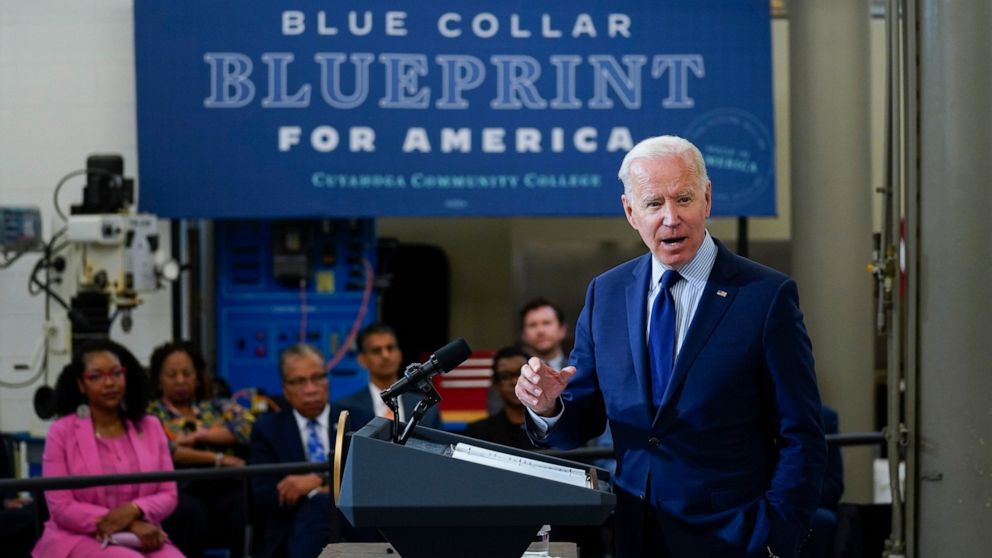Biden's $6T budget: Social spending, taxes on business
President Joe Biden is proposing a $6 trillion budget for next year that’s piled high with new safety net programs for the poor and middle class
May 28, 2021, 6:53 PM
6 min read
Share to FacebookShare to TwitterEmail this article
8:43
President Joe Biden, speaking in Virginia, praised America’s significant progress in the fight against the coronavirus pandemic.
The Associated PressWASHINGTON -- President Joe Biden on Friday unveiled a $6 trillion budget for next year that’s piled high with new safety net programs for the poor and middle class, but his generosity depends on taxing corporations and the wealthy to keep the nation’s spiking debt from spiraling totally out of control.
Biden has already described, in general terms, major plans on infrastructure and he won a big victory on COVID-19 relief earlier this year. Friday’s rollout incorporates those costs into the government’s budget framework, including Social Security and Medicare, providing a fuller view of the administration’s fiscal posture.
The administration sees a $1.8 trillion deficit next year and steadily accumulating federal debt that has topped $28 trillion after well over $5 trillion in already approved COVID-19 relief. As a result, the government must borrow roughly 50 cents of every dollar it spends this year and next.
With the deficit's growth largely unchecked, Biden would use proposed tax hikes on businesses and high-earning people to power huge new social programs like universal prekindergarten, large subsidies for child care and guaranteed paid leave.
“The best way to grow our economy is not from the top down, but from the bottom up and the middle out,” Biden said in his budget message. “Our prosperity comes from the people who get up every day, work hard, raise their family, pay their taxes, serve their Nation, and volunteer in their communities.”
The budget incorporates the administration’s eight-year, $2.3 trillion infrastructure proposal and its $1.8 trillion American Families Plan and adds details on his $1.5 trillion request for annual operating expenditures for the Pentagon and domestic agencies.
Acting White House budget chief Shalanda Young said the Biden plan “puts these pieces together and does exactly what the president told the country he would do. Grow the economy, create jobs and do so responsibly by requiring the wealthiest Americans and big corporations to pay their fair share.”
Biden’s budget is sure to give Republicans fresh ammunition for their criticisms of the new Democratic administration as bent on a “tax and spend” agenda that would damage the economy and impose a crushing debt burden on younger Americans. And he’s facing a nettlesome fight with Republicans who say he’s shorting the military.
“It is insanely expensive. It dramatically increases nondefense spending and taxes" and would weaken the Pentagon, said South Carolina Sen. Lindsey Graham, top Republican on the Budget Committee and a generally pragmatic GOP voice on spending bills. “There will be serious discussions about government funding. But the Biden budget isn’t serious and it won’t be a part of those discussions.”
Veteran GOP Sen. Richard Shelby, whose help is needed to pass annual agency budget bills, blasted Biden’s plan as “a blueprint for the higher taxes, excessive spending" that also "shortchanges our national security.”
Biden is a veteran of a long-gone Washington that fought bitterly in the 1980s and 1990s to wrestle the deficit under control. But there hasn’t been any real effort to stem the flow of red ink since a tea party-driven moment in 2011 that produced unpopular automatic spending cuts that were largely reversed over the ensuing decade.
Huge deficits have yet to drive up interest rates as many fiscal hawks have feared, however, and genuine anti-deficit sentiment is difficult to find in either political party.
The unusual timing of the budget rollout — the Friday afternoon before Memorial Day weekend — indicates that the White House isn’t eager to trumpet the bad deficit news.
Under Biden’s plan, the debt held by the public would quickly match the size of the economy and soon eclipse record levels of debt relative to gross domestic product that have stood since World War II. That’s despite more than $3 trillion in proposed tax increases over the decade, including an increase in the corporate tax rate from 21% to 28%, increased capital gains rates on top earners and returning the top personal income tax bracket to 39.6%.









